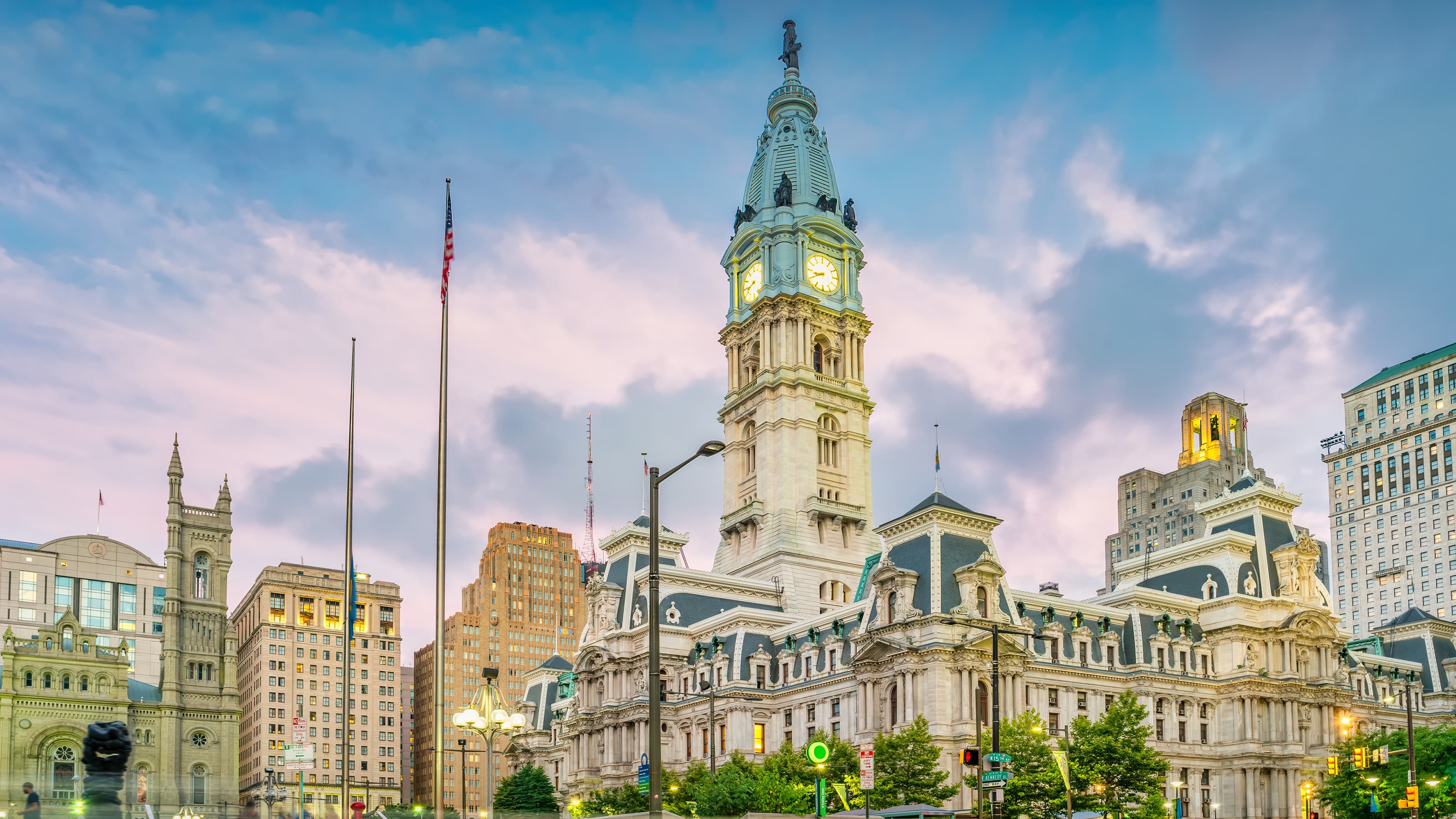What You Need to Know About the Effects of COVID-19 on the Real Estate Market
Though the real estate market was not exempt from the impacts of COVID-19, the pandemic has brought about new opportunities for change and growth.

- Saint Joseph’s Real Estate and Construction Alumni Chapter hosted a panel discussion on Dec. 8 to discuss the short- and long-term effects of COVID-19 on the real estate market.
- The group of industry professionals discussed the obstacles faced by the real estate industry and their projections for 2021.
- Net proceeds from the event will benefit the Haub School of Business real estate and construction programs and projects, and provide support for students and families facing hardship due to the pandemic.
Like many industries in 2020, real estate was not immune to the economic impacts of COVID-19. But with every obstacle faced, there were lessons to be learned, opportunities to ban together and hope for growth in the future.
In a panel discussion hosted by Saint Joseph’s Real Estate and Construction Alumni Chapter on Dec. 8, a group of industry experts discussed the short- and long-term effects of COVID-19 on the real estate market.
Nearly 200 alumni, students and friends attended the virtual event, which kicked off with a welcome from Haub School of Business Dean Joseph DiAngelo, Ed.D. Net proceeds from the event will benefit the school’s real estate and construction programs and projects, and provide support for students and families facing hardship due to COVID-19.
For those unable to attend this lively discussion moderated by alumnus Joseph F. Kessler, Esq. ’79 (B.A.), partner and Real Estate Group chair at Dilworth Paxson LLP, and with audience Q&A moderated by alumna Raelene McCarthy '99 (B.S. and M.S.), mid-Atlantic regional sales manager for Allsteel, we’ve rounded up some of the key takeaways from the panel.
1. Swift action and adaptability were critical early on in the pandemic.
When COVID-19 struck in the spring, shutdowns and changes to daily business operations rendered some industries inoperable.
“The biggest obstacle was in the very beginning when real estate wasn’t considered essential,” said Allan Domb, owner and broker of Allan Domb Real Estate and Philadelphia councilmember, who worked with Governor Wolf to make real estate essential in the state of Pennsylvania.
Domb also collaborated with leaders in the hospitality and restaurant industries to determine what they needed to endure the pandemic. “They came up with sidewalk seating and streeteries,” he said, bills which the councilmember introduced and was able to pass by all members of Philadelphia City Council.
“The city approved over 750 restaurant [permits] in three days,” he said.
2. Stimulus packages, PPP loans and rent deferrals are necessary for industries bearing the brunt of pandemic.
Industries like restaurants, hospitality and transportation are being hit especially hard by the pandemic.
“If you look at the restaurant industry alone, there could be 30 to 35% of these businesses that could close without an additional stimulus,” said Bruce Goodman, founder and CEO of Goodman Properties.
Added Domb: “The area of biggest concern right now is hospitality. The hotels are getting crushed. … Our SEPTA system is getting totally decimated. We need funding for mass transit; that’s a big part of our city.”
When asked what the panel would do to improve or protect the industry if given the opportunity, they spoke of stimulus packages, raising the minimum wage and supporting small businesses.
“I think the government needs to have a targeted stimulus package, as certain industries need it more than others like small businesses and restaurants,” said Goodman. “PPP was not enough in many cases.”
Ed (Ward) J. Fitzgerald III, global CEO and managing principal of Exeter Property Group, also spoke of raising the minimum wage.
“There need to be policies in place for those people who can’t protect themselves,” he said. “I believe the minimum wage should be raised again in certain parts of the country where people can’t support themselves.”
As for supporting retail tenants, Goodman talked about rent deferrals and supporting tenants as they navigate PPP loans, or the Paycheck Protection Program.
“We’re going to continue doing what we’ve been doing for the last eight or nine months,” he said. “We’re going to continue to work with our tenants and give them assistance by deferring rent — and in some cases reducing rent for short periods of time — and help them with PPP loans when they become available.”
3. The life sciences could hold the keys to Philadelphia’s growth.
There’s great opportunity for the City of Philadelphia to lean into its strength as a hub for pharmaceutical and biotechnology companies.
“Philadelphia has been highlighted as the pharma capital of the world,” said Fitzgerald. “We need to embrace those businesses and bring them into the city and region to become the world’s powerhouse in the life sciences — centered around Cira Centre and the Schuylkill Yards,” he said.
Continuing to bring those businesses to the city would ultimately lead to job growth.
“Having a strategic plan for the city with the penultimate goal of being one of the top five job generators in the country — and that all pieces of legislation and regulation need to be vetted through that sieve — I think starts to send a real positive message on attracting business,” added Gerard (Jerry) H. Sweeney, CEO and trustee of Brandywine Realty Trust.
4. The office as we know it may start to evolve.
The multi-tenant office building with open-concept floor plans and communal workspaces may be changing as a result of the pandemic.
“We’re likely going to see a greater predominance — especially in the suburbs of Philadelphia and in the country — of single tenant office buildings,” said Fitzgerald. “I think that the concept of multi-tenancy is going to be difficult because of COVID. Corporations want to control their environment more than ever.”
That environment includes shared lobbies, elevators and parking lots, he explained — common areas that could pose potential health risks during a pandemic. But it’s not just the configuration of spaces that need to be considered, it’s also the air quality within those spaces.
“We’re seeing more and more tenants looking for office space focused on items that used to be page 20 of the RFP, which includes fresh air intake, filtration systems and vertical transportation systems,” said Sweeney.
Since many older buildings won’t have the ability to make these changes, Sweeney predicts an acceleration of new development in 2021.
5. The future is filled with opportunity.
Despite the obstacles faced by the real estate, hospitality and travel industries, one word rang true throughout the panel discussion: hope.
“Human nature has an amazing resiliency and adaptability to return life to normal,” said Sweeney. “We’re in a good pace to come back strong.”
In addition to opportunities for new development in 2021, Principal of Goodman Properties Adam Goodman spoke of opportunities in retail as well.
“COVID ended up being the great accelerator for the retail industry,” he said. While consumers are moving away from malls and big box stores as shopping destinations, he predicted that shopping centers and main street retail will stand the test of time.
“We’re focused on creating a better place for customers to shop at shopping centers, and we’re focused on investing in main street retail. The central business district of Philadelphia will always be a place that people want to shop and open up restaurants.”
Learn more about Saint Joseph’s Real Estate and Construction Alumni Chapter.
This event was sponsored by ABM, Berkadia, Brandywine Realty Trust, Buccini/Pollin Group, Dilworth Paxson LLP, Jackson Cross, Keystone Appraisal Company, M&T Bank, Philadelphia Suburban Development Corporation, and VERY Real Estate.



